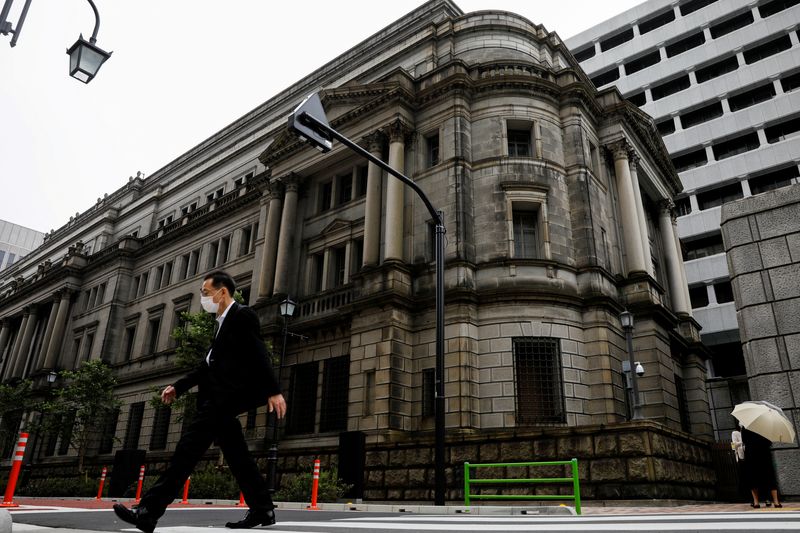By Leika Kihara
TOKYO (Reuters) -Bank of Japan (BOJ) Governor Haruhiko Kuroda said on Thursday any future debate on an exit from ultra-loose monetary policy will centre on the pace of increase in short-term interest rates and adjustments in the bank's massive balance sheet.
Kuroda brushed aside the chance of a near-term interest rate hike, stressing that the BOJ must continue to underpin a fragile economic recovery with loose monetary policy.
But he said the BOJ can debate an exit strategy from its massive stimulus and head toward policy normalisation when achievement of its 2% inflation target, accompanied by wage increases, comes into sight.
"It's premature to lay out details of an exit strategy. But one major factor of debate will be the pace of increase in the BOJ's short-term policy rate, now set at -0.1%," Kuroda told parliament.
"Another factor would be how to adjust its balance sheet," he said, adding that most major central banks were moving ahead with rate hikes, before shifting toward a full-blown decrease in their balance sheets.
Kuroda held talks with Prime Minister Fumio Kishida later on Thursday, where the two discussed a range of issues including the weak yen, global economic risks and the need to drive up wages, the BOJ governor told reporters after the meeting.
"We discussed the need for the government and the BOJ to work closely together, and guide policy flexibly to structurally raise wages," said Kuroda.
While Kuroda continues to stress the need to maintain easy policy, the central bank chief has been commenting more often in recent months on the chance of a future exit from ultra-low rates as rising raw material costs push inflation above his 2% target.
BOJ policymakers last month debated the need to examine the side-effects of prolonged easing and the impact of a future exit from easy conditions, a summary of opinions showed, a sign they are becoming more open to the possibility of an eventual withdrawal of Kuroda's radical stimulus.
Kuroda said wages are likely to increase ahead as companies respond to intensifying labour shortages and recent rises in living costs, though the outlook remained highly uncertain.
"It's extremely important for the BOJ to underpin the economy with ultra-loose monetary policy and ensure the necessary environment falls into place for companies to hike wages," Kuroda said.
The BOJ remains an outlier in the global wave of monetary tightening to combat soaring inflation. The divergence between the BOJ's dovish stance and the U.S. Federal Reserve's aggressive rate hikes has pummelled the yen to 32-year lows, exacerbating a jump in import prices and households' cost of living.
Kuroda said recent "rapid and one-sided" yen declines were undesirable as they make it difficult for firms to set business plans.
But the BOJ would not directly target yen moves in guiding monetary policy, he said, and predicted that slowing U.S. growth will eventually bring the dollar's broad uptrend to a halt.
"I don't think it's necessarily correct to assume the dollar's current single-handed rise will continue," Kuroda said of the next year's market outlook.

Under its yield curve control (YCC) policy, the BOJ guides short-term rates at minus 0.1% and caps the 10-year bond yield around zero as part of efforts to sustainably achieve its 2% inflation target.
The BOJ chief also told parliament that he had no desire to get re-appointed for another term to head the central bank, after his current one ends in April next year.